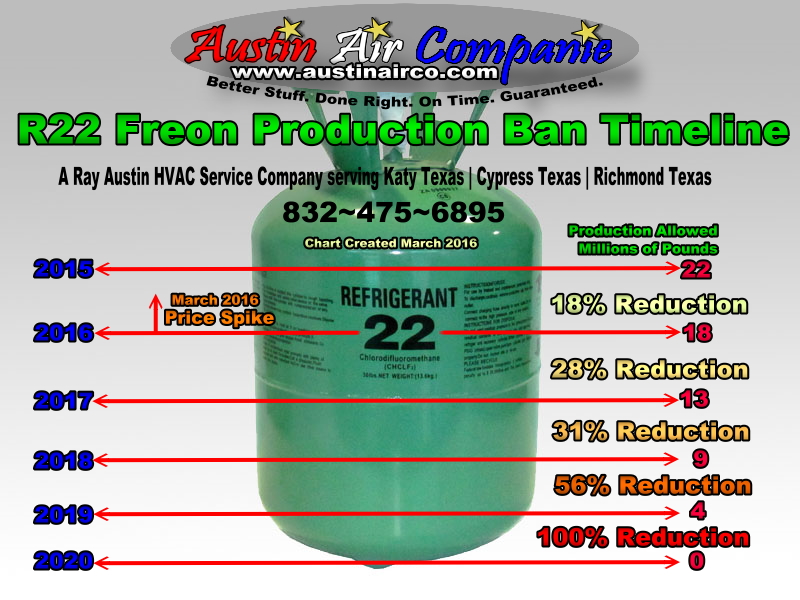Hello and welcome to #1 Katy Texas Air Conditioning blog. This is Ray Austin writing this, no AI or untrained, inexperienced people were used to construct any of this blog post. I am a Texas Licensed HVAC Contractor (TACLB28416E). I have over 30 years experience fixing, repairing, retrofitting, installing AC’s components etc.
Things are changing in HVAC. The title to this blog post is specific to an issue you may or “may not” have. You have to understand that R22 Freon is an older refrigerant that AC’s used since the 1960’s that began a phase out in 2000 with new equipment ban for this refrigerant in 2010. There were loop holes within that and manufacturers shipped dry units for about an additional 4 years after that up to around 2014 or so. Those units typically only came with 5 year part warranty only.
I can repair R22 Freon air conditioning units. This statement is not a gimmick, these are not free services. If you agree to pay my service fee to inspect your R22 Freon Air Conditioning unit I can give you recommendations on what you can do to repair your AC unit.
The cost of R22 Freon is very expensive. I can not give estimates over the phone. This job is an in person job. I need to visually see what I am dealing with to make a recommendation.
This situation is more difficult this year than in the past because everything costs more. But to get an honest answer as to what is your best way forward… I can give you options for you to choose from.
I will explain the risk of each option and the cost to you in person. Once you understand the risk(s) you can choose which option works for you.
It may be best for you to replace a part of your AC system. I show that I can do this by the video below. I have over 30 years experience as of 2024.
Thank you for visiting with me today. As always I hope your day is comfortable.
About the Author of the #1 Katy, Texas Air Conditioning Blog:
Ray Austin is a Texas licensed HVAC contractor that owns and operates Austin Air Companie. (TACLB28416E).
I have an AOS degree in HVAC / Refrigeration Mechanic and chose the path of specializing in residential based air conditioning and heating systems (HVAC). I have the ability to trouble shoot single speed systems as well as 2 speed system all the way up to inverter systems. I am universally certified to handle any refrigerant. I know what refrigerant your AC system needs.
I have HVAC zoning experience that I use at my own home in Katy, Texas. I have helped 100’s of people (your neighbors) transition away from R22 Freon to R410a refrigerant. In 2025 a new phase out will begin and I will help those willing to trust me to make the switch again to a good refrigerant of the future.
Things are changing in HVAC. Much of these changes are motivated by cost. The risk is sometimes related to waste. Because I have such lengthy experience I know what to do as well as what not to do.
Gimmicks run the roost of the HVAC world. Make sure you fully understand the choices you are about to make. Because waste of money is not what I would recommend.
To be clear, your AC may not have a refrigerant problem. This is why you pay money to get it inspected, by someone you trust. I work for you. Techs work for a pay check.
I am in homes every year in which they should have called me first and listened to what I was telling them as certain companies like to act a good game laced in things that are free, that aren’t truly free.
If I fixed it once, I can fix it again. If I fixed it once, it will break again.
(they all break)
The home of BETTER AC Service & No GIMMICKS. Welcome home.
Austin Air Companie 832~475~6895 call Ray today, get service TODAY.

